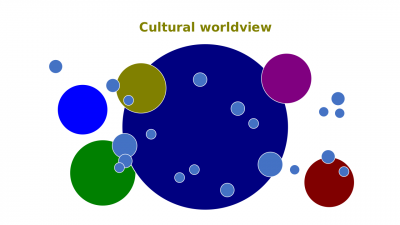Difference between revisions of "Cultural intelligence"
(→Definition) |
|||
| (57 intermediate revisions by one other user not shown) | |||
| Line 1: | Line 1: | ||
| − | [[File:Cultural-relativism.png|400px|thumb|right|[[Cultural | + | [[File:Cultural-relativism.png|400px|thumb|right|[[Cultural worldview]]]][[Cultural intelligence]] refers to cultural awareness and sensitivity skills. |
| + | |||
==Definition== | ==Definition== | ||
According to [[Management by Robbins and Coulter (14th edition)]], | According to [[Management by Robbins and Coulter (14th edition)]], | ||
| − | :[[Cultural intelligence]]. Cultural awareness and sensitivity skills. | + | :[[Cultural intelligence]]. [[Cultural awareness]] and sensitivity skills. |
| + | According to the [[HRBoK Guide]], | ||
| + | :[[Cultural intelligence]]. Measure of competence in culturally diverse situations. A person's ability to function in multicultural situations and to interact appropriately with people from different backgrounds. | ||
| + | |||
| + | ==Awareness== | ||
| + | :''Main wikipage: [[Cultural awareness]]'' | ||
| + | |||
| + | ===Worldview=== | ||
| + | :''Main wikipage: [[Cultural worldview]]'' | ||
| + | |||
| + | :[[Cultural worldview]] is one's [[worldview]] on [[cultural diversity]]. Three basic distinctive views are: | ||
| + | :#'''[[Parochialism]]''', which is one's viewing the world solely through your own perspectives, leading to an inability to recognize differences between people. While being coupled with [[ingroup favorism]], ''parochialism'' may serve as the ground for one's [[ethnocentric attitude]] or even [[racism]]. | ||
| + | :#'''[[Cultural apathy]]''', which is one's awareness that [[cultural diversity]] exists, but it is not easy or even worthy to be explored. This ''apathy'' may serve as the ground for one's [[polycentric attitude]]. | ||
| + | :#'''[[Global mindset]]''' ([[Global mindset|cultural open-mindedness]]), which is one's awareness that [[cultural diversity]] exists and willingness to embrace it. This ''mindset'' may serve as the ground for one's [[geocentric attitude]]. This mindset refers to the attributes that allow a [[leader]] to be effective in [[cross-cultural environment]]s. | ||
| + | |||
| + | ===Attitude=== | ||
| + | :''Main wikipage: [[Cultural attitude]]'' | ||
| + | |||
| + | :[[Cultural attitude]] is one's [[attitude]] that someone has toward own and other [[culture]]s. Three basic distinctive ''attitudes'' are: | ||
| + | :#[[Ethnocentric attitude]]. Similar to [[ingroup favorism]], the [[parochial belief]] that the best work approaches and practices are those of the home country. | ||
| + | :#[[Polycentric attitude]]. The view that the managers in the host country know the best work approaches and practices for running their businesses. | ||
| + | :#[[Geocentric attitude]]. A world-oriented view that focuses on using the best approaches and people from around the globe. | ||
| + | |||
| + | ===Identity=== | ||
| + | :''Main wikipage: [[Cultural identity]]'' | ||
| − | [[ | + | :[[Cultural identity]] is one's self-affiliation (or categorization by others) as a member of a cultural [[group]]. |
| − | [[ | + | :*[[Ingroup favorism]]. Perspective in which one sees members of own [[ingroup]] as better than other people, and, often, people not in own group as all the same. |
| − | [[ | + | :[[Cultural allegiance]]. |
[[Category: Management]][[Category: Articles]] | [[Category: Management]][[Category: Articles]] | ||
Latest revision as of 17:11, 19 July 2020
Cultural intelligence refers to cultural awareness and sensitivity skills.
Definition
According to Management by Robbins and Coulter (14th edition),
- Cultural intelligence. Cultural awareness and sensitivity skills.
According to the HRBoK Guide,
- Cultural intelligence. Measure of competence in culturally diverse situations. A person's ability to function in multicultural situations and to interact appropriately with people from different backgrounds.
Awareness
- Main wikipage: Cultural awareness
Worldview
- Main wikipage: Cultural worldview
- Cultural worldview is one's worldview on cultural diversity. Three basic distinctive views are:
- Parochialism, which is one's viewing the world solely through your own perspectives, leading to an inability to recognize differences between people. While being coupled with ingroup favorism, parochialism may serve as the ground for one's ethnocentric attitude or even racism.
- Cultural apathy, which is one's awareness that cultural diversity exists, but it is not easy or even worthy to be explored. This apathy may serve as the ground for one's polycentric attitude.
- Global mindset (cultural open-mindedness), which is one's awareness that cultural diversity exists and willingness to embrace it. This mindset may serve as the ground for one's geocentric attitude. This mindset refers to the attributes that allow a leader to be effective in cross-cultural environments.
Attitude
- Main wikipage: Cultural attitude
- Cultural attitude is one's attitude that someone has toward own and other cultures. Three basic distinctive attitudes are:
- Ethnocentric attitude. Similar to ingroup favorism, the parochial belief that the best work approaches and practices are those of the home country.
- Polycentric attitude. The view that the managers in the host country know the best work approaches and practices for running their businesses.
- Geocentric attitude. A world-oriented view that focuses on using the best approaches and people from around the globe.
Identity
- Main wikipage: Cultural identity
- Cultural identity is one's self-affiliation (or categorization by others) as a member of a cultural group.
- Ingroup favorism. Perspective in which one sees members of own ingroup as better than other people, and, often, people not in own group as all the same.
- Cultural allegiance.
